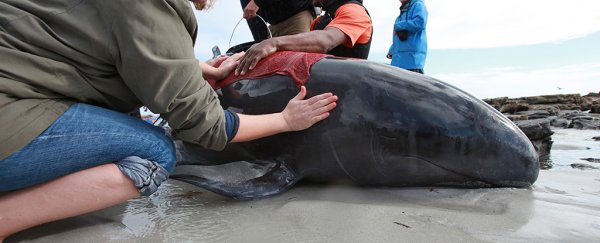Since the 1980s scientists have spotted a link between naval sonar systems and beaked whales seemingly killing themselves - by deliberately getting stranded on beaches. Now, researchers might have revealed the horrifying reason why.
In short, the sound pulses appear to scare the whales to death, acting like a shot of adrenaline might in a human, and causing deadly changes in their otherwise perfectly calibrated diving techniques.
By studying mass stranding events (MSEs) from recent history, the team found that beaked whales bring a sort of decompression sickness (also known as 'the bends' or 'divers' disease') on themselves when they sense sonar. When panicked, their veins fill up with nitrogen gas bubbles, their brains suffer severe haemorrhaging, and other organs get damaged.
"In the presence of sonar they are stressed and swim vigorously away from the sound source, changing their diving pattern," one of the researchers, Yara Bernaldo de Quiros from the University of Las Palmas de Gran Canaria in Spain, told AFP.
"The stress response, in other words, overrides the diving response, which makes the animals accumulate nitrogen."
The end result is these poor creatures die in agony after getting the whale version of the bends – not something you would normally expect from whales that are so adept at navigating deep underwater.
Typically, these animals naturally lower their heart rate to reduce oxygen use and prevent nitrogen build-up when they plunge far below the surface. Tragically, it appears that a burst of sonar actually overrides these precautions.
The researchers weighed up the evidence from some 121 MSEs between the years 1960 and 2004, and particularly focussed on the autopsies of 10 dead whales stranded in the Canary Islands in 2002 after a nearby naval exercise.
It's here that the decompression sickness effects were noticed, as they have been in other stranding events that the researchers looked at.
While the team notes that the effects of sonar on whales seem to "vary among individuals or populations", and "predisposing factors may contribute to individual outcomes", there does seem to be a common thread in terms of what happens to these unsuspecting mammals.
That's especially true for Cuvier's beaked whale (Ziphius cavirostris) – of the 121 MSEs we've mentioned, 61 involved Cuvier's beaked whales, and the researchers say they appear particularly vulnerable to sonar.
There's also a particular kind of sonar to be worried about: mid-frequency active sonar (MFAS), in the range of about 5 kilohertz.
Now the researchers behind the new report want to see the use of such sonar technology banned in areas where whales are known to live – such a ban has been in place in the Canary Islands since the 2002 incident.
"Up until then, the Canaries were a hotspot for this kind of atypical stranding," de Quiros told AFP. "Since the moratorium, none have occurred."
The research has been published in the Royal Society Journal Proceedings B.
